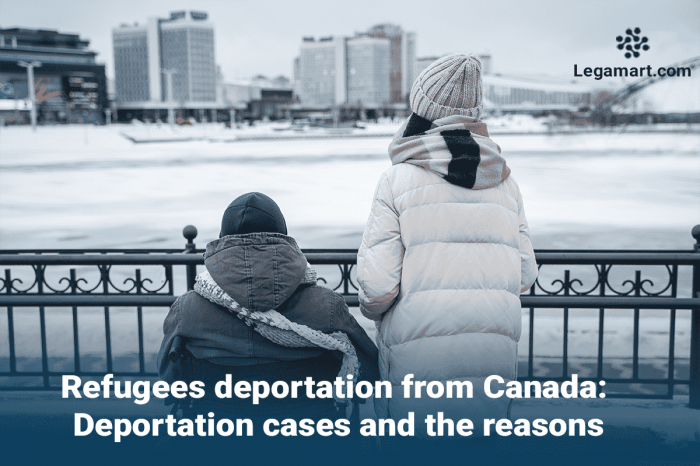Deportation
Deportation occurs when a person is ordered to leave the country that they are currently in. Potentially, individuals can be deported from a host country for violating immigration laws or overstaying on their visa. Legal issues can arise because the individual may not be able to receive fair legal representation, despite being afforded procedural rights. There are also legal remedies available for individuals facing deportation, including asylum, appeals, or voluntary departure. International legal issues come up when conflicts arise between the host country where the individual is living illegally and others countries where the individual wants to live or as seen in cases where the existing laws are perceived to be inadequate or unjust towards immigrants of some countries.
Find best lawyers for Deportation
Issues related to Deportation
Deportation of criminals:
The issue of deporting criminals is a complicated one. On the one hand, arguments favour deported criminals being removed from society and not being allowed to return. But on the other hand, there are arguments against deportation that claim it can lead to other criminal activity.
There are a few factors to consider when weighing the pros and cons of deportation as a punishment for criminals. One key factor is whether or not the person has committed a violent crime. Another factor to consider is whether the person has strong ties to their home country and family. If they do, deporting them could make them more likely to commit crimes to eliminate the need to support their family from afar.
Deportation of refugees and asylum seekers
There is a lot of debate surrounding the deportation of refugees and asylum seekers. Some people argue that it is humane to deport refugees back to their country of origin, while others claim that it is inhumane and unnecessarily cruel. So, what is the best way to deal with this issue?
The answer to this question depends on many factors, including the particular circumstances of each case, the country of origin, and the laws in place. However, some general principles can be applied in all cases.
Any decision to deport a refugee or asylum seeker should only be made after a thorough assessment of their case.


Deportation of children
The deportation of children is always a complex and sensitive issue. In some cases, children may be returned to their country of origin with their families. However, there are also situations where unaccompanied minors are deported back to countries where they have never lived. This can often be a very traumatic experience for these children.
There are several reasons why the deportation of children may occur. Sometimes, it may be because the child has committed a crime or because their parents have been deported and are considered “unaccompanied minors.” In other cases, it may be because the family lives undocumented in the country and is caught up in Immigration and Customs Enforcement (ICE) raids.
The legal implications of deportation
The legal implications of deportation are vast and can vary greatly depending on the situation. In general, however, deportation can mean removal from a country, often resulting in losing residency status and other related privileges. It is also worth noting that deported individuals may be banned from returning to the country they were deported from for a certain amount of time.
There are some reasons why an individual might be deported, and the process can be initiated by either the individual or the government. Some common reasons for deportation include entering a country illegally, overstaying one’s visa, committing a crime, or posing a national security threat.

Latest Articles
Tell us more about your problem.
Please give a brief description about what it is you need to talk to our lawyers about ?
Frequently Asked Questions
How can online legal platforms assist immigrants who are facing deportation?
Online legal platforms can assist immigrants who are facing deportation by providing a range of services and resources, including:
Legal representation: Online legal platforms can connect immigrants with experienced immigration lawyers who can provide legal representation and support throughout their deportation proceedings.
Immigration advice: Platforms can offer immigration advice to help immigrants understand their legal rights and options and provide guidance on navigating the complex deportation process.
Appeals and motions: Platforms can assist immigrants in filing appeals or motions to reopen their cases and provide legal assistance in arguing their case before the immigration court.
Bond hearings: Platforms can assist immigrants in obtaining a bond hearing and represent them during the hearing to argue for a lower bond amount or release on recognizance.
Waivers and petitions: Platforms can assist immigrants in preparing and filing waivers or petitions that may help them avoid deportation.
Resources and support: Online legal platforms can provide a range of resources, such as informational articles, toolkits, and support groups, to help immigrants facing deportation understand their legal rights and access additional support and resources.
By offering these services and resources, online legal platforms can help immigrants facing deportation navigate the complex legal system, understand their legal options, and increase their chances of success. Moreover, these platforms can provide support not only to immigrants but also to their families and other affected individuals.
What are the legal options and rights available to immigrants who are facing deportation, and how can online legal platforms provide guidance on these options and rights?
Immigrants facing deportation have legal options and rights available to them, and online legal platforms can provide guidance on these options and rights. Some of the common legal options and rights available to immigrants facing deportation are as follows:
Asylum or refugee status: Immigrants who fear persecution in their home country because of race, religion, nationality, membership in a particular social group, or political opinion may be eligible for asylum or refugee status.
Cancellation of removal: Immigrants who have been in the US for at least 10 years and can demonstrate good moral character, and whose removal would result in extreme hardship to a US citizen or lawful permanent resident spouse, parent, or child, may be eligible for cancellation of removal.
Adjustment of status: Immigrants who are eligible to adjust their status to become a lawful permanent resident may be able to avoid deportation.
Prosecutorial discretion: Immigration authorities have the discretion to decide not to pursue deportation proceedings against certain individuals who meet specific criteria.
Voluntary departure: Immigrants who voluntarily depart the United States within a specified period may be able to avoid deportation.
Motion to reopen: Immigrants who have been ordered deported may be able to file a motion to reopen their case if there were errors in the original proceedings or if new evidence has become available.
Online legal platforms can provide guidance on these options and rights by offering a range of resources such as:
Informational articles and guides about deportation proceedings, including an explanation of the various options and rights available to immigrants facing deportation.
Eligibility assessment tools that help immigrants determine which options may be available to them based on their circumstances.
Legal representation: Platforms can connect immigrants with experienced immigration lawyers who can provide legal representation and support throughout their deportation proceedings.
Immigration advice: Platforms can offer immigration advice to help immigrants understand their legal rights and options and provide guidance on navigating the complex deportation process.
Appeals and motions: Platforms can assist immigrants in filing appeals or motions to reopen their cases and provide legal assistance in arguing their case before the immigration court.
By providing these resources, online legal platforms can help immigrants facing deportation understand their legal options and rights, increase their chances of success, and ensure that they are treated fairly under the law.
What are some common deportation issues, and how can online legal platforms help resolve them?
Some common deportation issues that immigrants may encounter include:
Lack of legal representation: Many immigrants facing deportation do not have adequate legal representation or cannot afford an attorney, which can make it difficult to navigate the complex legal system.
Language barriers: Immigrants who do not speak English fluently may face language barriers when communicating with government officials and understanding their legal rights and options.
Inability to access resources: Immigrants facing deportation may struggle to access essential resources such as legal assistance, mental health services, and financial support.
Detention conditions: Detained immigrants may face poor living conditions, inadequate medical care, and limited access to legal assistance.
Online legal platforms can help resolve these issues by providing a range of resources and services such as:
Legal representation: Online legal platforms can connect immigrants with experienced immigration lawyers who can provide legal representation and support throughout their deportation proceedings.
Translation services: Platforms can offer translation services to assist immigrants in communicating with government officials and understanding their legal rights and options.
Resources and support: Online legal platforms can provide a range of resources, such as informational articles, toolkits, and support groups, to help immigrants facing deportation understand their legal rights and access additional support and resources.
Mental health services: Some online legal platforms offer mental health services to help immigrants cope with the stress and trauma of facing deportation.
Advocacy and activism: Online legal platforms can also engage in advocacy and activism efforts to raise awareness about the issues faced by immigrants facing deportation and push for reforms in the immigration system.
By providing these resources and services, online legal platforms can help immigrants facing deportation overcome the challenges they may encounter and ensure that they are treated fairly and justly under the law.
What are the reasons for deportation in the UK or China?
In the UK, immigrants may be subject to deportation for various reasons, including:
Criminal convictions: Immigrants who have been convicted of a criminal offense in the UK or abroad may be subject to deportation.
Overstaying visa: Immigrants who remain in the UK after their visa has expired may be subject to deportation.
Breach of immigration conditions: Immigrants who fail to comply with the conditions of their visa or stay in the UK may be subject to deportation.
National security concerns: Immigrants who pose a threat to national security, such as those involved in terrorism or espionage, may be subject to deportation.
Public policy concerns: Immigrants whose presence in the UK is deemed to be contrary to public policy, such as those who have engaged in hate speech or incitement, may be subject to deportation.
In China, immigrants may be subject to deportation for various reasons, including:
Illegal entry or overstaying visa: Immigrants who enter China illegally or remain in China after their visa has expired may be subject to deportation.
Violation of Chinese laws and regulations: Immigrants who violate Chinese laws and regulations, such as engaging in illegal employment or other criminal activities, may be subject to deportation.
National security concerns: Immigrants who pose a threat to national security, such as those involved in terrorism or espionage, may be subject to deportation.
Public order concerns: Immigrants whose presence in China is deemed to be contrary to public order, such as those who engage in disruptive or violent behavior, may be subject to deportation.
It is important to note that the specific reasons for deportation in the UK or China may depend on various factors, such as the individual circumstances of the immigrant’s case, applicable laws and regulations, and the discretion of the relevant authorities. Online legal platforms can provide guidance on the specific reasons for deportation in the UK or China, as well as provide resources, advice, and support for immigrants facing deportation.
What are the legal consequences of a deportation order in the UK or China for international entrepreneurs and businessmen?
The legal consequences of a deportation order in the UK or China for international entrepreneurs and businessmen can be severe, and may include:
In the UK:
Prohibition on re-entry: Individuals who are deported from the UK may be prohibited from re-entering the country for a specified period.
Inadmissibility: Individuals who have been deported from the UK may be deemed inadmissible for future visa applications, making it challenging to travel or conduct business in the country.
Adverse effects on reputation: A deportation order may have adverse effects on an individual’s professional and personal reputation, potentially impacting their ability to conduct business.
Loss of assets: Entrepreneurs or businessmen who have invested in the UK may lose their assets if they are deported.
In China:
Prohibition on re-entry: Individuals who are deported from China may be prohibited from re-entering the country for a specified period.
Inadmissibility: Individuals who have been deported from China may be deemed inadmissible for future visa applications, making it challenging to travel or conduct business in the country.
Adverse effects on reputation: A deportation order may have adverse effects on an individual’s professional and personal reputation, potentially impacting their ability to conduct business.
Confiscation of assets: Entrepreneurs or businessmen who have invested in China may have their assets confiscated if they are deported.
It is important to note that the specific legal consequences of a deportation order may depend on various factors, such as the circumstances of the individual’s case, applicable laws and regulations, and the discretion of the relevant authorities. Online legal platforms can provide guidance on the potential legal consequences of a deportation order in the UK or China and offer resources, advice, and support to minimize the negative impact of these consequences on international entrepreneurs and businessmen.
What are the options and procedures for appealing a deportation order in the UK or China?
The options and procedures for appealing a deportation order in the UK or China may vary depending on several factors, such as the circumstances of the individual’s case, applicable laws and regulations, and the discretion of the relevant authorities. However, some general options and procedures are as follows:
In the UK:
Administrative review: Individuals who have been served with a deportation order may be able to request an administrative review of the decision by the Home Office.
Appeal: If an administrative review is unsuccessful, individuals may have the right to appeal the deportation order to the First-tier Tribunal (Immigration and Asylum Chamber).
Judicial review: In certain cases, individuals may be able to seek a judicial review of the decision, which involves reviewing the legality and fairness of the decision-making process.
In China:
Reconsideration: Individuals who have been served with a deportation order may be able to request a reconsideration of the decision by the Public Security Bureau.
Appeal: If a reconsideration is unsuccessful, individuals may have the right to appeal the decision to a local court.
Administrative litigation: In certain cases, individuals may be able to initiate administrative litigation to challenge the decision, which involves seeking a court judgment on the legality of the decision.
It is important to note that the specific options and procedures for appealing a deportation order in the UK or China may depend on various factors, such as the individual circumstances of the case, applicable laws and regulations, and the discretion of the relevant authorities. Online legal platforms can provide guidance on the specific options and procedures for appealing a deportation order in the UK or China, as well as provide resources, advice, and support for individuals facing deportation.











